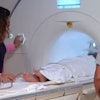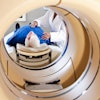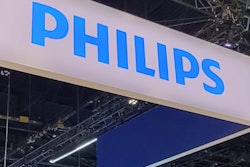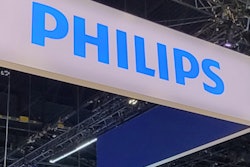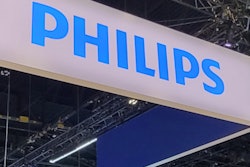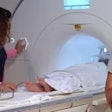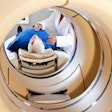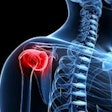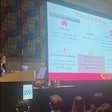CHICAGO -- Philips unveiled a range of products at RSNA 2023 aimed at helping improve the efficiency of radiologists, enhance radiology workflows, and speed up imaging exams.
AI/informatics
Philips's 2023 RSNA focus for AI is offering tools that will allow radiologists to focus on patient care – in part to mitigate burnout, which 45% of radiologists report, the company said.
In its booth, the firm highlighted its HealthSuite Imaging cloud-based, next generation of Vue PACS; the package is hosted by Amazon Web Services (AWS) and offers high-speed, remote access for diagnostic exam interpretation, integrated reporting, and AI-assisted workflow orchestration, according to the vendor.
The company said it has already migrated 80 sites in the U.S. and Latin America to HealthSuite Imaging PACS, it said. In addition, it plans to work with AWS and utilize Amazon Bedrock software to develop efficient clinical workflow applications across its imaging portfolio.
Philips is also emphasizing AI Manager, a software platform that integrates with a facility's IT infrastructure and enables radiologists to make use of more than 100 AI tools.
Digital x-ray/image-guided therapy
The company is showcasing innovations to its Radiography 7000 M mobile system and Radiography 7300 C premium system, and its next-generation image-guided therapy system, Azurion 7 B20/15 biplane configuration, which offers flexible positioning for easier patient access.
MRI
Philips also displayed a mobile version of its BlueSeal MR Mobile 1.5-tesla fully sealed, helium-free magnet in a truck parked near its booth.
In the truck, BlueSeal MR Mobile connects to Philips' Radiology Operations Command Center, a multivendor, multimodality service that connects technologists to remote imaging experts in real-time using audio, video, and text chat. In 2024, Philips will be taking a BlueSeal MR Mobile truck on a roadshow in the U.S., visiting up to 18 cities. Another truck will also be hitting the road in Europe.
The company also launched three new lightweight MR Smart Fit radiofrequency coils that feature a flexible design and lower exam setup times. Used in concert with the vendor's SmartSpeed AI software, the new coils include Smart Fit TorsoCardiac 1.5T – which can bend more than 90 degrees in all directions; Smart Fit 1.5T shoulder, which reduces setup time by 10% when compared to 1.5-tesla musculoskeletal 16 dual coil setup), the company said; and Smart Fit Knee 3.0T, which is pending clearance from the U.S. Food and Drug Administration (FDA).
CT
In CT, Philips directed attention to a work-in-progress version of its Collaboration Live tool for CT. The new collaboration software is currently pending FDA clearance.
Ultrasound
At the meeting, Philips highlighted the next generations of its flagship ultrasound systems, Epiq Elite 10.0 and Affiniti. The new Epiq Elite features Philips's MVI Super Resolution contrast-enhanced ultrasound (CEUS) software, which offers a spatial resolution improvement of more than 200%, according to the firm; it also includes Philips' mL26-8 ultra-high frequency transducer, which boosts spatial resolution by 36% and improves visualization by 64% compared to the company's previous transducers, it said.
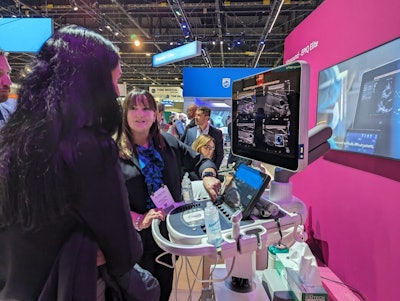 Philips showcased the next generation of its Epiq Elite ultrasound scanner at RSNA 2023.
Philips showcased the next generation of its Epiq Elite ultrasound scanner at RSNA 2023.
Both systems also now feature a common user interface and benefit from transducer compatibility across the vendor's ultrasound scanner portfolio.
In addition, the company showcased its Flow Viewer software, which offers advanced, 3D-like vascular blood flow imaging, and its Auto Scan Assistant tool that makes workflow more efficient – reducing button pushes by 54%, it said.
Finally, Philips has upgraded its Collaboration Live tool, which can now allow up to six users to collaborate in real-time during an ultrasound exam.
Sustainability
Philips also highlighted developments from its research collaboration with Vanderbilt University Medical Center. Circular business models such as upgrades can reduce total cost of ownership of an MR system by up to 23% and cut carbon emissions by 17%, according to a Philips and Vanderbilt team.
For CT, refurbished systems can decrease cost of ownership by up to 10% and reduce carbon emissions by 6%. Equipment upgrades can lower costs by up to 8% and cut carbon emissions by 4%, Philips said.
Vanderbilt researchers shared their experience on the project in two talks at RSNA 2023.
Philips has also debuted a campaign called "Care Means the World," which is based on the idea that "human health and environmental health go hand in hand," it said.

